- Home
- William Gaddis
The Recognitions Page 5
The Recognitions Read online
Page 5
For one dedicate in the Lord’s service, as Aunt May assured him that he was, Wyatt seemed already to have piled up a tidy store of sin. He could move in few directions without adding to it. His most remarkable accomplishment had occurred right after Hallowe’en. He was in his mother’s sewing room going through the button drawer, in the afternoon when he should have been taking his nap, when she came in. She was dressed in white, and although she appeared to be looking for something, she did not seem to see him. He ran toward her, crying out with pleasure, but before he could reach her she turned and went out, at the instant Aunt May came through the door. —She was here, where did she go? Mother was here . . . , he started to Aunt May, with barely another word when that flesh-and-bloodless woman picked him up and took him to his bed, to force him down there with little more than a turn of her wrist, and leave him to “beseech the Lord” to help him stop lying. It was days later when Aunt May called him to her, shaking, with an opened letter in her hand, and had him repeat that lie in detail. Quivering like the letter he stared at in her hand, he spoke with frightened reluctance, as though this were a device, logical for Aunt May, to promote more punishment. But when he was done Aunt May had him kneel beside his bed and pray to the Lord to help him forget it, pray to the Lord to forgive him. She even knelt with him.
The Lord had not helped him: he remembered it very well. There was some confusion in his mind when his father returned, for somehow his father and the Lord were the same person and he almost asked his father to help him forget it. That would not do, because Aunt May had told him never to tell his father. Didn’t his father know? And if the Lord was everywhere, hadn’t He seen Camilla come in, dressed in a white sheet, looking for something?
Aunt May never mentioned that again. But she lost no time telling his father about the rabbit. —I scarcely know how to tell you, she commenced, and when Gwyon looked satisfactorily alarmed she went on, —Your son has learned, somewhere, to swear. It’s scarcely surprising, with a grandfather who talks to him just the way he talks to his cronies in the saloon, and fills him full of all kinds of drivel . . . She went on to explain that she had taken a toy away from Wyatt every time this happened (being lenient), until he was left with only one, a cloth rabbit. (For the truth of that, the words which cost him those treasures were darn and heck: she seemed to know their euphemistic derivation well enough.) —And then, the last straw, I . . . I can scarcely repeat his words. Though Heaven knows how they are engraved on my memory. He knew I was in the room, he was sitting on the floor with his last toy, this rabbit, and he said . . . your son said, as clearly as I’m speaking now, he said, “You’re the by-Goddest rabbit I ever damn saw!” At which, hearing herself speak this, Aunt May almost sobbed crying out, —What kind of a Christian mi . . . mish . . . minister do you think he will make?
Wyatt was, in fact, finding the Christian system suspect. Memory of his fourth birthday party still weighed heavily in his mind. It had been planned cautiously by Aunt May, to the exact number of hats and favors and portions of cake. One guest, no friend to Wyatt (from a family “less fortunate than we are”), showed up with a staunchly party-bent brother. (Not only no friend: a week before he had challenged Wyatt through the fence behind the carriage barn with —Nyaa nyaa, suckinyerma’s ti-it-ty . . .) Wyatt was taken to a dark corner, where he later reckoned all Good works were conceived, and told that it was the Christian thing to surrender his portion. So he entered his fifth year hatless among crepe-paper festoons, silent amid snapping crackers, empty of Christian love for the uninvited who asked him why he wasn’t having any cake.
On Sunday mornings he would sit tugging buttons or strands of horsehair from the pew’s upholstery, trying to work out a way to circumvent surrender of the coin in the wet palm of his hand. But the untoward moment always arrived, heralded by a voice singing, he believed, from Heaven, —All things come of Thee O Lord and of Thine own give we back to Thee. He later learned that it was no heavenly voice at all, but Mrs. Dorman, a dumpy deep-chested boarding-house keeper, strategically placed somewhere up in the vicinity of the bell tower. The rest of the congregation was being victimized by this ruse, and he might have enlightened them but for the prospect of the yellow bar of laundry soap. And aside from the actual buying power of five cents, it was the notion that it had once belonged to the Lord he resented: what use that covetous heavenly host could have for a nickel . . . —Praise God from whom all blessings flow, burst the choir, and the money was carried away in a wicker basket never to be seen on earth again.
Now, even before the day was out, Wyatt was back staring through his window. After the near-silent midday meal, Aunt May sent him to his room for singing an indecent song.
—Singing? Gwyon demanded.
—He was humming it.
—But . . . humming? How . . .
—He knows the words well enough. It’s a saloon song, he learned it from that . . . that dirty old man.
The Town Carpenter had left his daughter’s upbringing to an aunt and a silent cousin named Mary. He was a floridly untidy fellow, lopsided from pushing a plane, so he said, and could usually be found in the Depot Tavern when his working day was done, around eleven in the morning. Some years before, his own mother’s death had robbed him of his main occupation: retrieving her from the foot of the granite Civil War monument in the center of town where she went when the house oppressed her, and squatted there in any weather cross-legged under a blanket. The Town Carpenter’s one accomplishment to date had been fathering Camilla. As for the course of recent events, this man having taken her on as a spiritual and economic responsibility and then left her inoperative in a land surrounded by foreigners, mountains, and the sea: he was somewhat muddled. What he could make out with little difficulty was the disapproval of his dead wife’s sister and the silent cousin, both of whom wanted the body back. From convenient habit he disagreed with them. This gave him good excuse for staying away from home. It was in the Depot Tavern that he received condolences, accepted funerary offers of drink, and, when these recognitions were exhausted, he sank into the habit of talking familiarly about persons and places unknown to his cronies, so that several of them suspected him of reading. Vague as it had been, his period of mourning did not last long for his temper was not suited to it, and he was never known to mention his daughter’s name, in the Depot Tavern at any rate, again.
In the immediate family, blood proved thicker than three thousand miles of sea water; and prospect of scandal precluded any schismatic activities the Gwyon blood might not have taken care of. They faded in thin-lipped silence, though there were a few, wavering souls haunted by Darwinian shadows of doubt, who, when the mocking companion from Gibraltar was discovered, made it known to one another that they had no intention of forgiving him, in this world or the next.
In the late spring Reverend Gwyon returned to the pulpit of the First Congregational Church. The people inherently respected him, for their fathers had held his father in almost as high regard as they held their own. The name had the weight of generations behind it since, two centuries before, Reverend John H. Gwyon had been butchered by disaffectionate Indians whose myth he had tried to replace with his own. Most of that congregation pointed out pillars of Puritan society among their forebears, who had never permitted maudlin attachment to other human beings to interfere with duty. To suffer a witch to live was as offensive to the God of Calvin, Luther, and Wesley, as it was to That of the Pope of Rome; and as though bent on surpassing the record of the Holy Inquisition in the neighborhood of Toulouse, where four hundred were burned in half a century, these stern hands kept the air of the New World clean the same way, and might well have been locked up had they appeared among this present posterity, but were wisely exiled in death. They had done their work, passed on the heritage of guilt. The rest was not their business.
This congregation admired the Reverend’s bearing up, as they called it, under his suffering (though there were an evilly human few who envied him his Providence) and they
had never had the full details of the Spanish affair. Enough to know that their minister was of familiar lineage, had suffered sore trials, and was now returned from temporal disasters to lead them unfaltering, by word and example, in the ways of Christian fortitude.
His sermons took up a lively course. In his loneliness, Gwyon found himself studying again. With the loss of Camilla he returned to the times before he had known her, among the Zuñi and Mojave, the Plains Indians and the Kwakiutl. He strayed far from his continent, and spent late hours of the night participating in dark prac tices from Borneo to Assam. On the desk before him, piled and spread broadcast about his study, lay Euripides and Saint Teresa of Avila, Denys the Carthusian, Plutarch, Clement of Rome, and the Apocryphal New Testament, copies of Osservatore Romano and a tract from the Society for the Prevention of Premature Burial. De Contemptu Mundi, Historia di tutte l’Heresie, Christ and the Powers of Darkness, De Locis Infestis, Libellus de Terrificationibus Nocturnisque Tumultibus. Malay Magic, Religions des Peuples Non-civilisés, Le Culte de Dionysos en Attique, Philosophumena, Lexikon der Mythologie. On a volume of Sir James Frazer (open to the heading, Sacrifice of the King’s Son) lay opened The Glories of Mary, and there underlined, —There is no mysticism without Mary. Behind the yew trees, whose thickly conspired branches and poison berries guarded the windows, night after night passed over him, over the acts of Pilate, Coptic narratives, the Pistis Sophia, Thomas’s account of the child Jesus turning his playmates into goats; but the book most often taken from its place was Obras Completas de S Juan de la Cruz, a volume large enough to hold a bottle of schnapps in the cavity cut ruthlessly out of the Dark Night of the Soul.
In church his congregation attended his sermons out of stern habit, and occasionally with something uncomfortably like active interest they were swayed. They even permitted him to regale them in Latin, and later, with growing incidence as years passed, he dashed their petrous visages with waves from distinctly pagan tongues, voluptuous Italian, which flowed over their northern souls like sunlit water over rocks. They had not much use for that slovenly race. He exhorted them to breathe out when they prayed, . . . or was it breathe in? No one, alone with God afterward, was certain. And when unrest showed on those gray shoals, he put them at dismal ease once more by reminding them that they were, even at that moment, being regarded from On High as a stiff-necked and uncircumcised generation of vipers: they found such reassurances comforting.
He even managed to re-institute wine for the grape juice prescribed by temperate elders in the celebration of the Eucharist, rousing his flock one sunny morning with the words, —Drink no longer water, but use a little wine for thy stomach’s sake and thine often infirmities. That upset Aunt May, and though she could not presume to argue with Saint Paul the Apostle, it was at moments like this that she suspected him of never having really got over being Saul the Jew of Tarsus, with a nose like Saint Edmund, and those dirty intemperate habits Jews are famous for. Unlike her charity and that of her Societies, which never ventured south of the sixtieth parallel except for forays into darkest Africa, Gwyon’s troubled everyone by reaching no further than the sound of his own voice for objects worthy of mercy. Janet, a girl with a tic which drew her head to one side in bright affirmative inclinations of idiocy, exemplar of a lapse from Puritan morality on the part of her mother (done in by a surgical belt salesman from New York), was found sharing a slap and tickle with the church janitor behind the organ one night after choir practice. Janet had been born a number of minutes after her mother’s death, which some including Aunt May regarded as a bad sign from the start. The incident behind the organ proved it, and Aunt May said something about the stocks and the pillory, a shame they’d gone out of fashion. —A shame to deprive us all of that satisfaction, Gwyon agreed. She was wary. —What do you mean? —The great satisfaction of seeing someone else punished for a deed of which we know ourselves capable. —But I . . . —What is more gratifying than this externalizing of our own evils? Another suffering in atonement for the vileness of our own imaginings . . . —Stop it! cried Aunt May, —I’m sure I have never had such thoughts. —Then how can you judge her crime, if you have never been so tempted? he asked quietly. —You . . . you are speaking like a heretic, Aunt May brought out, —a heretic from your church and your . . . and from your family . . . ! and she left the room.
The text for the following Sunday’s sermon was taken from the Sermon on the Mount (Matt. 7:1), and Janet became kitchen girl in Reverend Gwyon’s household.
There were a few, of an intuitive nature seldom bred in such a community, who suspected his charity to be a mask behind which he dissembled a sense of humor to mock them all. The Town Carpenter was one of these. He commenced to appear regularly on Sunday mornings in the dimmer sections of the church, dressed in policeman suspenders and shirts so respectfully modest that they even concealed the usually prominent top button of his underwear.
The parsonage was a clapboard house whose interiors were done in dark paper and wainscoting. Most of the downstairs windows were darkened by outside trees. As the master unpacked, its character changed, realizing itself for the first time in sympathy with the obscurity. Watts’s painting of Sir Galahad, in the hall leading to the study, was replaced by a small cross bearing a mirror in each extremity. A robin, a thrush, and a bluejay (mounted by a distant cousin who had found taxidermy the Way Out and was last seen in the Natural History Museum in Capetown, South Africa, drinking himself to death in a room full of rigid hummingbirds he had stuffed himself) gave up their niche to the defaced stone figure of a Spanish saint, Olalla. A picture of an unassuming elk skulking among empty trees was replaced by a copy of a painting by the elder Breughel; and Saint Anthony’s insanity manifest in the desert was hung over the unfaded square caused and covered by a painting of Trees (done by a maiden relative long since gone to earth, and rescued now by Aunt May).
A large low table appeared under the window in the dining room. It was the prize of this incipient collection, priceless, although a price had been settled which Gwyon paid without question to the old Italian grandee who offered it sadly and in secret. This table top was the original (though some fainaiguing had been necessary at Italian customs, confirming it a fake to get it out of the country), a painting by Hieronymus Bosch portraying the Seven Deadly Sins in medieval (meddy-evil, the Reverend pronounced it, an unholy light in his eyes) indulgence. Under the glass which covered it, Christ stood with one maimed hand upraised, beneath him in rubrics, Cave, Cave, D8 videt . . .
—Catholic! said Aunt May, sounding anathema in her voice. She added something about Catholic, or Spanish, vanity anent the mirrors in the arms of the cross. Reverend Gwyon thought it best not to explain their purpose.
As for the distinctly heathen monkey, it was forced to live in the carriage barn.
It is the bliss of childhood that we are being warped most when we know it the least. In the medievally construed parsonage Wyatt graduated from the potty to more exalting porcelain eminence, and learned to pick his nose with his forefinger instead of his thumb. He spent more time indoors than out, and there was a chill in those dim corridors which no change of season dispelled, passages where he was often found wandering aimlessly, or simply standing still, gazing at the grooves in the wainscoting or up at the concave molding, to listen to the creaks that came from the sharp angles of woodwork, to talk to himself repeating words and phrases over and over, and then to move as though he were being watched. He could stand until interrupted by the opening of the study door behind him, and his father’s garbled exclamation of surprise at finding him there staring up at the cross mounting the four small mirrors, though he never asked about it; and there was only one hall he avoided, or hurried when he had to pass through it to the dining room, even then with a quick look over his shoulder at Olalla watching, noseless, from her niche, the hand upraised, which he fully expected to strike him from behind as he passed.
—Al-Shira-al-jamânija . . . , he whispered.
—What?
What is it you’re saying? Aunt May demanded, rounding a corner.
—Al-Shira-al-jamânija . . . the bright star of Yemen . . .
—Where do you hear things like that? she scolded. —Yemen indeed! And she turned him toward the stairs, and sent him up to read in Foxe’s Book of Martyrs, one of the books provided to prepare him for the Lord’s work. From the first time he was asked, —Do you love the Lord Jesus? he was uncomfortably embarrassed; and since hate is an easier concept to embody than love, the Pope trod in far more substantial reality through the frightened corridors of his mind than did the Lord. At such an age, the Blood of the Lamb provoked no pleasant prospect for bathing; and resurrection a dispensable preoccupation for one who had not yet lived. If it was (as she said) in the way of God that he walked with Aunt May, he might only have protested that her horny feet prepared her where his did not: only the exclusive atmosphere of this thorny expedition proved for a time unwholesomely attractive, that, and promise that his mother had already arrived in that intermediate Elysium where he would join her, whither, even then, Aunt May led by a dead reckoning of Orphic proportion. To say nothing of fear, and less of terror, for the jealous God wielded by Aunt May made the sinner’s landscape of after-Death more terrible even than his happy life on earth. —The devil finds work for idle hands, she taught him, and —In Adam’s fall / We sinned all, with the grim penitence of one who had never had opportunity.
The two of them, father and son, grew away from her in opposite directions. Wyatt grew forward, escaping for the most part in casual innocence any who would hold him back with the selfish nostalgia of love. And his father seemed to find the adventure of daily life more and more trying. Reverend Gwyon retreated from it, by centuries, whenever he could escape to his study, where he sank, inhumed until her voice struck with the sharpness of a gravedigger’s pick. As men whose sons are born to them late in life do often, he regarded Wyatt from a wondering distance, saw in his behavior a phantasy of perfect logic demonstrating those parts of himself which had had to grow in secret. It is true they shared confidences, but even these usually centered about oddments from the forepart of Gwyon’s mind, topics he might have left a minute before in his study, from Ossian, or Theophrastus, to the Dog Star, a sun whose rising ushered in the inundation of the Nile, Al-Shira-al-jamânija, the star of heat and pestilence, which Gwyon spoke of familiarly when he found himself forced to conversation by the abrupt and even more shy presence of this fragment of himself he kept encountering. He even spoke his son’s name unfamiliarly. (But there was reason for that. Months before the boy’s birth, he and Camilla had agreed, if it were a son, to name him Stephen; and not until months after their son was born, and Aunt May had peremptorily supplied the name Wyatt from somewhere in the Gwyon genealogy, did they remember. Or rather, Camilla remembered, and though it might have been a safe choice, for the name’s sake of the first Christian martyr, even to Aunt May, neither of them mentioned it to her, for baptism had already taken place.)

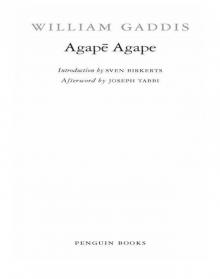 Agapē Agape
Agapē Agape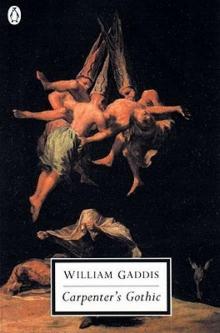 Carpenter's Gothic
Carpenter's Gothic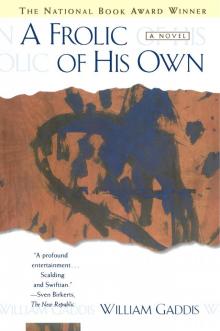 Frolic of His Own
Frolic of His Own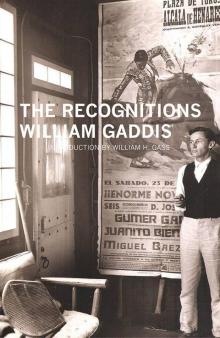 The Recognitions
The Recognitions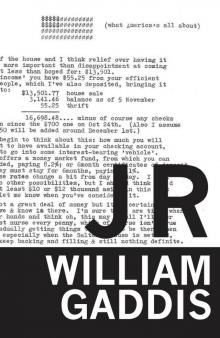 J R
J R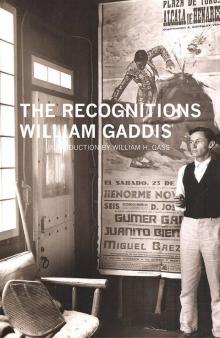 The Recognitions (Dalkey Archive edition)
The Recognitions (Dalkey Archive edition)